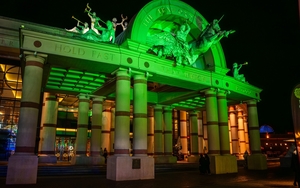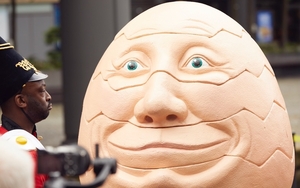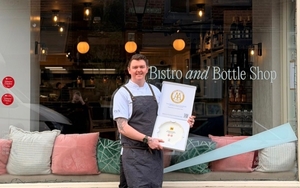We went to the Palace Theatre to meet Simba, Nala, Rafiki, and a pretty famous bird puppet
It’s not every day that you get to hear Circle of Life live in a conference room at the back of The Palace Theatre. You don’t meet bird puppets and get the inside scoop from a touring cast and crew very often either.
Everybody in the auditorium turns into a child and has that wonderful innocence, every single time
Since its debut in 1997, over 110 million people have seen the stage adaptation of Disney’s The Lion King. It’s also travelled to over 100 different cities across the globe. Everyone knows those iconic opening chords that we’ve all tried to replicate and subsequently butcher whilst the animals of Pride Rock walk into the sunset. It’s actually pronounced “nants ingonyama bagithi baba”, in case you didn’t know (we didn’t either).
After a long and successful 25 years on stage, The Lion King is back on tour with a seven-week stint at The Palace Theatre on Oxford Street - beginning in October 2022. With the same incredible soundtrack, innovative staging, and a dedicated team both on and off stage, it's one of those shows that you could take your nan and your man to at the same time because it’s impossible not to love.
Talking about the history of the show, what it means to be a part of such a legacy, and just how they manoeuvre their bodies in those giant lion heads, we met up with the touring cast and crew of The Lion King.
Of stage and screen
The Lion King animated feature film came out in 1994, complete with music from Sir Elton John, Tim Rice, and Hans Zimmer. To give the whole film that “authentic African feel”, the Disney team also worked with Lebohang Morake, commonly known as Lebo M, who wrote and performed the Zulu elements of the soundtrack and directed the African choir. After the success of Disney Theatrical’s Beauty and the Beast Broadway production that very same year, the next stage adaptation was awarded to The Lion King.
Disney Theatrical’s President, Tom Schumacher, warned the team, “You’re crazy”, as he couldn’t imagine much more than a group of people dressed in furry outfits parading around on all fours. They then took a huge risk on director Julie Taymor.
It’s a puppet
Julie Taymor, The Lion King’s director, was given the task of creating an immersive on-stage production out of an animated feature. A task made much harder by the fact that the whole cast is animals and it's set in an African savannah. With little experience on anything of this scale and no previous work on broadway, what made Julie special were her skills as “an amazing puppeteer who knew that she could write a song”. Julie had never even seen The Lion King prior to her biggest theatrical gig.
After setting out to replicate the characters and settings from the film, the first thing Julie created was the gazelle wheel. A bunch of bicycles screwed together with working gears, the structure is made in such a way that it replicates gazelles running across the savannah. Gazelle figures are attached to the gears that move as the wearer makes their way across the stage. Julie’s intentions were to “put the audience to work and play with their imagination”.

Using a combination of clever costumes and interactive puppets, The Lion King production also includes moving “grass heads”, life-size giraffes that require careful manoeuvring from inside the body of the animal itself, and a 4-man elephant puppet named Bertha that’s nine feet wide and thirteen feet long. These puppets make their way in and around the audience before landing on stage throughout the show’s opening number.
In The Lion King today, there are 230 different puppets that range in size and styles with some shadow puppetry, extensions of costume, and a tiny little mouse that’s only 5 inches long.
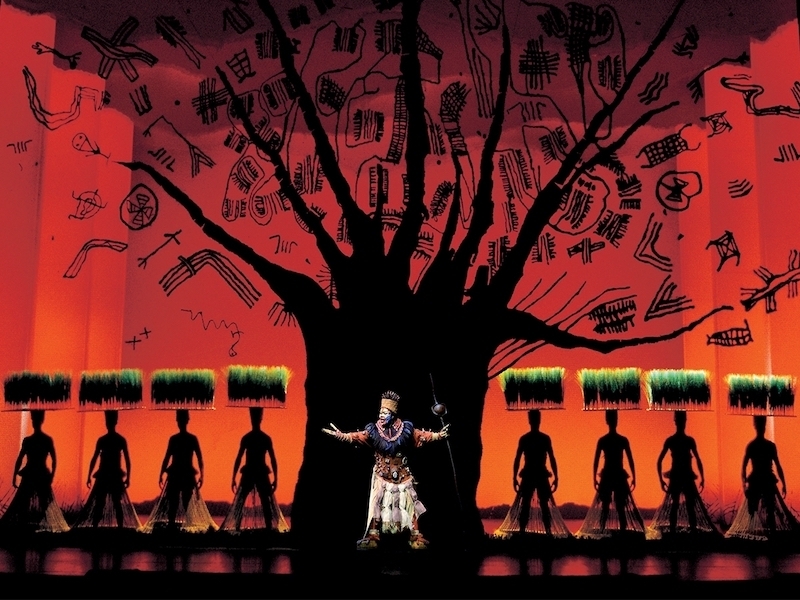
Rafiki
Julie’s creative direction also meant that Rafiki, the iconic monkey character from the film, would no longer be played by a man. Instead, one of the show’s longest-reigning cast members, Thandazile Soni, has played this central role since the show began back in 1997. The monkey was instead replaced by a sangoma, a figure that, in South African culture, is a spiritual leader that is responsible for the health of the community.
Thandazile has been singing the show’s opening number, Circle of Life, for over 20 years. Singing the opening note of the whole ordeal is, in her words, “the most magical thing ever. I don’t need to be singing anything else”. With this song, in particular, Thandazile believes, “It's really a blessing to be singing Circle of Life because you get to tell the whole story in one song”. It must be pretty good if you can belt it out every night for 20 years.
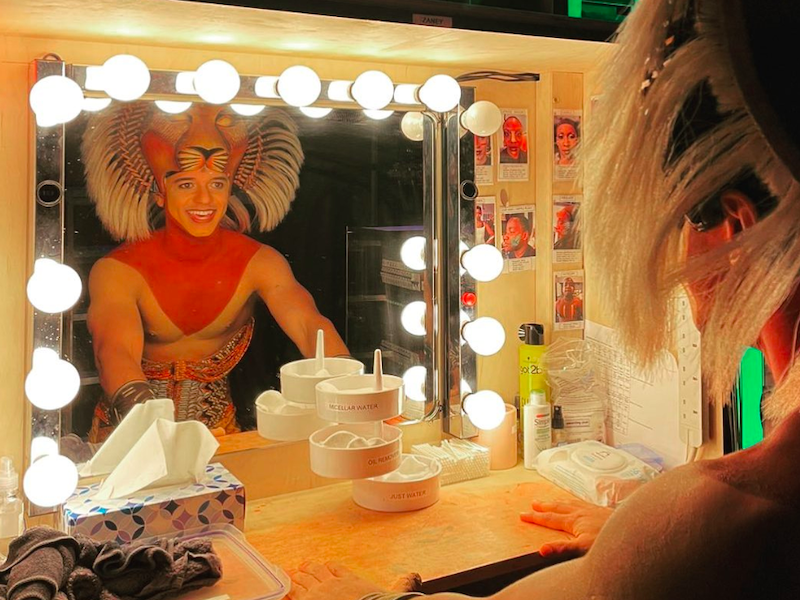
Simba
Simba is currently played by Stephenson Ardern-Sodje, an actor who took a far-from typical route to a full-time career on stage. Chatting about his background, Stephenson said, “I didn't actually train in musical theatre at all, and it wasn't the kind of thing I thought I was going to do with my life. I did an English degree and then I moved to London and I was working in an office and singing in a choir.
His moment came when, "Somebody posted on our choir Whatsapp group that Hamilton the musical was having open auditions, so I went to the open calls and got into the show. It changed my life in a way. I went from working nine to five to doing this on the West End in about two to three weeks, which was very crazy. It opened up all these doors and I was eventually booked as Simba in The Lion King”.
Talking about his part particularly, Stephenson loves that “Simba subverts the ideas behind a Disney Prince. He has a lot of vulnerability, and there are a lot of big heavy emotions that he has to deal with, and I love tapping into those things and showing the sides of him that, ironically, make him human, even though he’s a lion”.
Stephenson also explains that one hosting theatre received an email from the mother of a young boy who had recently lost his father. She explained that watching The Lion King really helped her son deal with the loss of his father as Simba’s journey was so like his own. If you don’t cry at the stampede scene then you’re made of stone.
Nala
Julie was keen on championing the female roles in The Lion King just as much as the usual trio of Simba, Scar, and Mufasa. That’s where Nokwanda Khuzwayo’s role as the lion princess Nala comes in. Nokwanda has performed in The Lion King all over the world, in several different languages. Off the top of her head “I have done it in Portuguese, Mandarin, and German, and actually, this is my first English-speaking production. I have been lucky to actually travel the world doing what I love”.
Explaining that the show has a universal appeal that makes it so timeless, Nokwanda said, “When we perform in it, our goal is to drive the story. Audiences can be so different but its always a reaction of enjoyment - even from the more reserved crowds. With Nala in particular, she’s strong, she’s a warrior, and she’s badass”. Of course she is, hun.
Wooden masks
The main characters in the show wear a combination of authentic, African costumes and large, carved masks that sit on top of their heads. Not technically puppets in themselves, Stephenson and Nokwanda explain that these masks are designed to be used as extensions of your own body.
Stephenson said, "It changes so much about your physicality. I didn't wear one until my final audition and from the moment you put it on you have to straighten your back and stand more powerfully. There's a style of movement that comes from Balinese dance that's very fluid but allows you to use your head as a kind of neck for the mask. It creates this sort of enhanced version of yourself."
Zazu
Zazu the hornbill is one of the few characters in The Lion King that operates purely as a puppet, with the genius that is Matthew Forbes behind his wings. In my head, a bird puppet involved some wing flapping and head moving and bam, it's like Zazu is right there in the flesh. Wrong.
Zazu is one of the more complicated puppets in the show, with Matthew describing the skills needed to operate him, “It's like trying to pat your head and rub your tummy at the same time, or a bit like riding a bike. There are lots of different triggers on this guy. I can make him blink or look surprised, I have to operate his mouth to lip-sync, move his slinky-style neck, and use separate triggers for his wings and feet. During rehearsals, I spent a lot of time talking with his eyelids or blinking with his mouth, and I stood in front of the mirror for a very long time.”
Matthew also explains that the ability of Julie’s creations to capture an audience and suspend their beliefs illustrates “the true beauty of puppetry”. Zazu’s master has also worked on puppet-led productions such as War Horse.
An oldie but a goodie
Why’s the show been around for so long? Why does it still sell out in every venue and draw back the same audiences over and over again?
Thandazile believes, “It's because the show has its own life, and it gives everything that it’s got to both the audience and the performers. It somehow reflects whatever emotions and experiences you felt yesterday, the day before, and the day before that, whether that’s happiness or frustration or anger or anything else. You find yourself whilst you're watching the show or performing it live on stage. It’s a story that’ll never die and it’s going to live for the longest time.”
Matthew adds, “I’m one of the last people to enter from the back of the auditorium, so I get to watch all of Circle of Life and get to see all of the reactions from everybody. What’s fascinating is that everybody in the auditorium turns into a child and has that wonderful innocence, every single time. You can see people really connecting with each other and there’s something really special about that shared narrative."
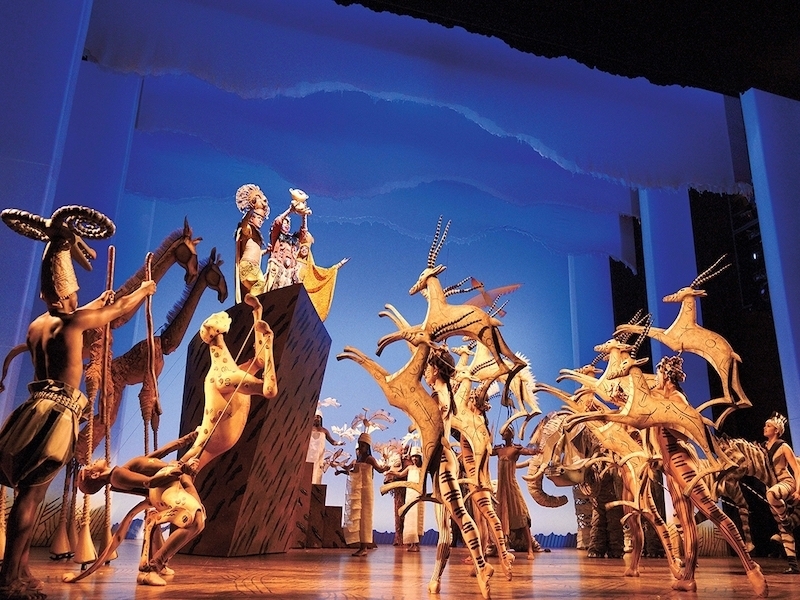
Go get 'em
The Lion King has extended its Autumn season at The Palace Theatre and will now run from Thursday 27 October 'til Sunday 19 February 2023. The extension coincides with the show welcoming its 20 millionth guest in the UK.
Tickets are now on sale for evening and matinee performances and are selling out fast so cop one quick. Tickets for the extended run go on sale from Friday 17 June at 10am.
Watch the original, practice your Zulu, and remember, Hakuna Matata.
Read next: Queer raves and juxtapositions: an interview with male go-go dancer Ali Saeedian
Read again: Top things to do in and around Manchester: June 2022
Get the latest news to your inbox
Get the latest food & drink news and exclusive offers by email by signing up to our mailing list. This is one of the ways that Confidentials remains free to our readers and by signing up you help support our high quality, impartial and knowledgable writers. Thank you!










